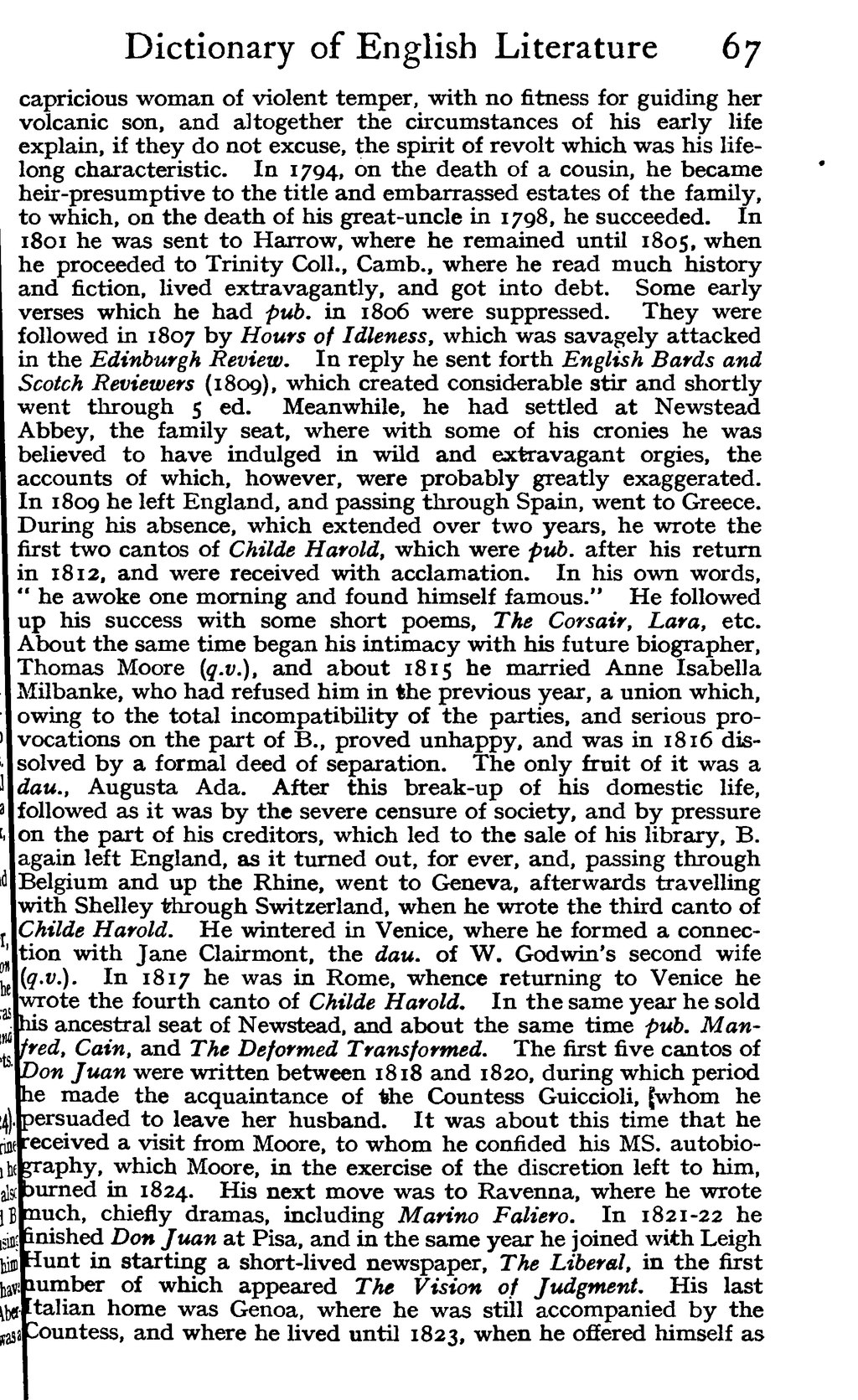capricious woman of violent temper, with no fitness for guiding her volcanic son, and altogether the circumstances of his early life explain, if they do not excuse, the spirit of revolt which was his lifelong characteristic. In 1794, on the death of a cousin, he became heir-presumptive to the title and embarrassed estates of the family, to which, on the death of his great-uncle in 1798, he succeeded. In 1801 he was sent to Harrow, where he remained until 1805, when he proceeded to Trinity Coll., Camb., where he read much history and fiction, lived extravagantly, and got into debt. Some early verses which he had pub. in 1806 were suppressed. They were followed in 1807 by Hours of Idleness, which was savagely attacked in the Edinburgh Review. In reply he sent forth English Bards and Scotch Reviewers (1800), which created considerable stir and shortly went through 5 ed. Meanwhile, he had settled at Newstead Abbey, the family seat, where with some of his cronies he was believed to have indulged in wild and extravagant orgies, the accounts of which, however, were probably greatly exaggerated. In 1809 he left England, and passing through Spain, went to Greece. During his absence, which extended over two years, he wrote the first two cantos of Childe Harold, which were pub. after his return in 1812, and were received with acclamation. In his own words, "he awoke one morning and found himself famous." He followed up his success with some short poems, The Corsair, Lara, etc. About the same time began his intimacy with his future biographer, Thomas Moore (q.v.), and about 1815 he married Anne Isabella Milbanke, who had refused him in the previous year, a union which, owing to the total incompatibility of the parties, and serious provocations on the part of B., proved unhappy, and was in 1816 dissolved by a formal deed of separation. The only fruit of it was a dau., Augusta Ada. After this break-up of his domestic life, followed as it was by the severe censure of society, and by pressure on the part of his creditors, which led to the sale of his library, B. again left England, as it turned out, for ever, and, passing through Belgium and up the Rhine, went to Geneva, afterwards travelling with Shelley through Switzerland, when he wrote the third canto of Childe Harold. He wintered in Venice, where he formed a connection with Jane Clairmont, the dau. of W. Godwin's second wife (q.v.). In 1817 he was in Rome, whence returning to Venice he wrote the fourth canto of Childe Harold. In the same year he sold his ancestral seat of Newstead, and about the same time pub. Manfred, Cain, and The Deformed Transformed. The first five cantos of Don Juan were written between 1818 and 1820, during which period he made the acquaintance of the Countess Guiccioli, whom he persuaded to leave her husband. It was about this time that he received a visit from Moore, to whom he confided his MS. autobiography, which Moore, in the exercise of the discretion left to him, burned in 1824. His next move was to Ravenna, where he wrote much, chiefly dramas, including Marino Faliero. In 1821-22 he finished Don Juan at Pisa, and in the same year he joined with Leigh Hunt in starting a short-lived newspaper, The Liberal, in the first number of which appeared The Vision of Judgment. His last Italian home was Genoa, where he was still accompanied by the Countess, and where he lived until 1823, when he offered himself as
Page:Cousins's Short Biographical Dictionary of English Literature.djvu/79
Dictionary of English Literature
25
